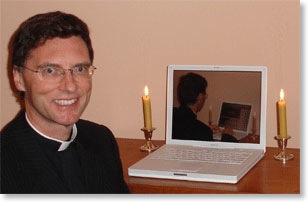About this site
Run by: Rev. Bosco Peters B.Theol (Hons) Melbourne College of Divinity, B. Sc. Canterbury, Dip.Tchg. Christchurch

Author of:
Celebrating Eucharist, DEFT, 1995
The Anglican Eucharist in New Zealand 1814-1989, (Joint Liturgical Study, Alcuin GROW #21, 1992) an abbreviation of my thesis;
and numerous articles in a variety of journals.
Former lecturer and examiner in Church, Ministry and Sacraments for L.Th. at College House Institute of Theology, Christchurch, guest lecturer 2007 Bible College of New Zealand in theology and film.
Member of Societas Liturgica.
Associate of Kopua Cistercian Monastery with a long interest in spirituality.
As well as many years of worship leadership as a lay person, I have served as a priest in the Anglican Church in rural and urban parishes, and am Chaplain at Christ’s College, Canterbury (New Zealand), an Anglican secondary school for boys. I have been a member of many committees dealing with worship issues including the Tikanga Pakeha Liturgical Working Group, General Synod, and Diocesan Standing Committee. I have travelled extensively, experiencing worship as diverse as in a hermitage in the Sahara, with thousands of young people at Taizé, on a boat on the Congo River, in Orthodox monasteries on Mount Athos, dancing at St Gregory of Nyssa Episcopalian Church in California, a Latin Mass in China, in a Christian Ashram in India, with Old Catholics in Utrecht, with missionary partners in South America, and on St Francis Day in St John the Divine Cathedral New York (this included a procession of animals, the last being an elephant).
Liturgy
The word “liturgy” comes from the Greek λειτουργια (leitourgia) – public work or duty, work of the people. Liturgy is the spiritual work of all God’s people. Liturgy is structured common prayer. It can be shared, common worship precisely because it is structured. Anglican (Episcopalian) liturgy is the glue and glory of that denomination. Other denominations also have a primary focus on liturgy: Roman Catholic, Old Catholic, Eastern Orthodox, Presbyterian, Methodist - in fact all churches and individuals structure their spirituality. Ecumenically there has been much growing together around liturgy and lectionary.
The word “Religion” derives from the Latin “re-ligare” – to re-connect. Religion provides the scaffolding that makes spirituality possible for the majority of people.
In our new context, the old dichotomies of religion verses spirituality, traditional verses liberal are breaking down.
Spirituality, the relationship with God, is nourished and expressed in worship, prayer, contemplative life, and meditation, individually and in community. There can be a new paradigm, a new model. This site affirms all that is good in worship that takes its cue from scholarly return to early-church sources as well as worship that takes its cue from our contemporary culture and environment. This website is part of taking seriously our Christian heritage and our current situation. It seeks to encourage worship that is vital, transforming, and faithful. Resources here are ecumenical and international. There is material for spirituality, worship, preaching, teaching, or a pew sheet.
The stance here is contemplative (loving God) and missional (loving others) – often called “emergent”. There is a focus on the Eucharist (Mass, Holy Communion) as the jewel in the crown. And also a highlighting of the Liturgy of the Hours (Daily Prayer- using the Bible as prayer) as the crown in which the jewel of the Eucharist is set. Hence, in the spirituality of this site, there is a balance of Eucharist, Liturgy of the Hours, Lectio Divina (individual prayerful hearing what the Spirit is saying in the scriptures), and silent contemplative prayer. There is a balance of solitude and community. A balance of liturgy as service of God, and our call to service of others.
A vision towards the future
We need to work together to put worship and spirituality to the forefront of our life and thinking, as the foundation and goal of our Christian life. People are clamouring for spirituality, for a relationship with God. This relationship is nourished and expressed in worship, prayer, contemplative life and meditation, individually and in community. There can be a new paradigm, a new model. This affirms all that is good in worship that takes its cue from scholarly return to early-church sources as well as worship that takes its cue from our contemporary culture and environment. This website is part of taking seriously our Christian heritage and our current situation. It seeks to encourage worship that is vital, transforming, and faithful. May the Holy Spirit guide our venture.
Yours in Christ
Bosco Peters

